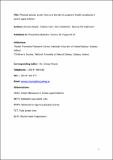| dc.contributor.author | Keane, Eimear | |
| dc.contributor.author | Kelly, Colette | |
| dc.contributor.author | Molcho, Michal | |
| dc.contributor.author | Nic Gabhainn, Saoirse | |
| dc.date.accessioned | 2021-04-01T11:04:54Z | |
| dc.date.available | 2021-04-01T11:04:54Z | |
| dc.date.issued | 2016-12-11 | |
| dc.identifier.citation | Keane, Eimear, Kelly, Colette, Molcho, Michal, & Nic Gabhainn, Saoirse. (2017). Physical activity, screen time and the risk of subjective health complaints in school-aged children. Preventive Medicine, 96, 21-27. doi:https://doi.org/10.1016/j.ypmed.2016.12.011 | en_IE |
| dc.identifier.issn | 0091-7435 | |
| dc.identifier.uri | http://hdl.handle.net/10379/16674 | |
| dc.description.abstract | Internationally, subjective health complaints have become increasingly prevalent in children. Thus, a comprehensive understanding of the determinants of health complaints is needed to inform effective policies and strategies. This study explores if meeting physical activity and total screen time (TST) recommendations are associated with the risk of reporting health complaints weekly or more. The 2014 Irish Health Behaviour in School-aged Children study collected questionnaire data from 10,474 10–17 year olds. Children reported how often they experienced eight health complaints as less than weekly or weekly or more. Children who met moderate-to-vigorous physical activity recommendations were active for 60 min/day in the past seven days. Three types of screen based activity were categorised to reflect if children met TST recommendations of ≤ 2 h/day. Poisson regression examined the association between meeting recommendations and the risk of health complaints. The prevalence of individual health complaints ranged from 20.4–44.3% in girls and from 10.1–35.4% in boys. Overall, 5.1% (4.5–5.6%) of girls and 8.7% (7.8–9.5%) of boys met both (physical activity and TST) recommendations, while two thirds of girls (67.3%, 66.1–68.5%) and over half of boys (55.0%, 53.5–56.6%) met neither recommendation. Not meeting TST recommendations was significantly associated with the risk of reporting health complaints while associations with physical activity were less apparent. Children who did not meet either recommendation had a significantly increased risk for six of the health complaints when compared to those who met both recommendations. As health complaints and poor lifestyle behaviours were common in children, population leve | en_IE |
| dc.format | application/pdf | en_IE |
| dc.language.iso | en | en_IE |
| dc.publisher | Elsevier | en_IE |
| dc.relation.ispartof | Preventive Medicine | en |
| dc.rights | Attribution-NonCommercial-NoDerivs 3.0 Ireland | |
| dc.rights.uri | https://creativecommons.org/licenses/by-nc-nd/3.0/ie/ | |
| dc.subject | Health complaints | en_IE |
| dc.subject | Physical activity | en_IE |
| dc.subject | Screen time | en_IE |
| dc.subject | Children | en_IE |
| dc.title | Physical activity, screen time and the risk of subjective health complaints in school-aged children | en_IE |
| dc.type | Article | en_IE |
| dc.date.updated | 2021-03-28T07:40:03Z | |
| dc.identifier.doi | 10.1016/j.ypmed.2016.12.011 | |
| dc.local.publishedsource | https://doi.org/10.1016/j.ypmed.2016.12.011 | en_IE |
| dc.description.peer-reviewed | peer-reviewed | |
| dc.contributor.funder | Department of Health, Ireland | en_IE |
| dc.internal.rssid | 12162784 | |
| dc.local.contact | Saoirse Nic Gabhainn, Dept. Of Health Promotion, Aras Moyola, Nui Galway. 3093 Email: saoirse.nicgabhainn@nuigalway.ie | |
| dc.local.copyrightchecked | Yes | |
| dc.local.version | PUBLISHED | |
| nui.item.downloads | 236 | |


